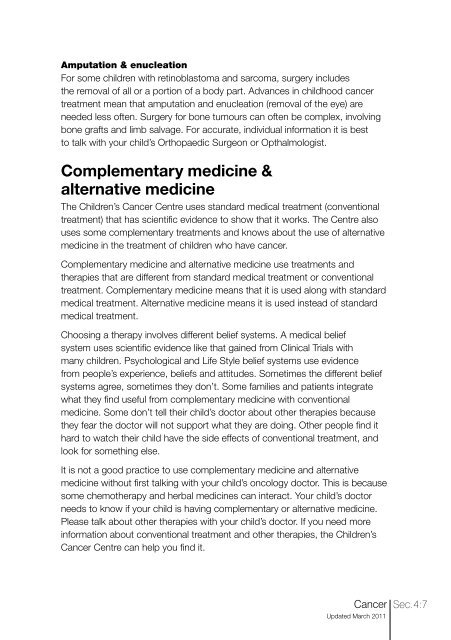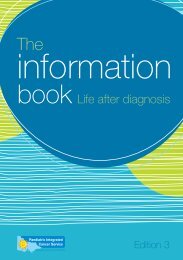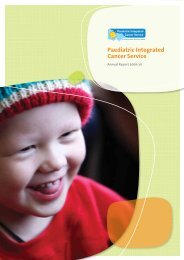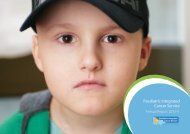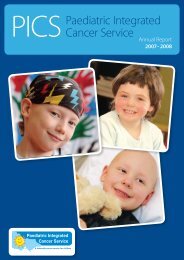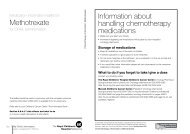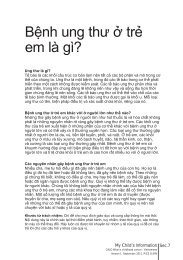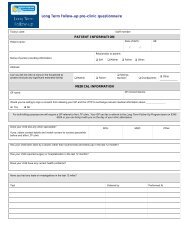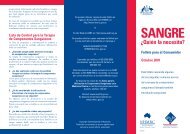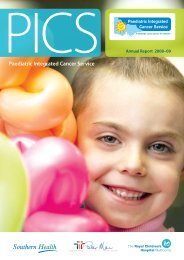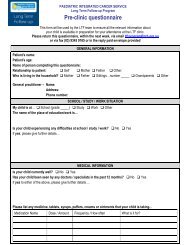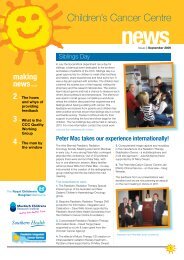The information book - Paediatric Integrated Cancer Service
The information book - Paediatric Integrated Cancer Service
The information book - Paediatric Integrated Cancer Service
You also want an ePaper? Increase the reach of your titles
YUMPU automatically turns print PDFs into web optimized ePapers that Google loves.
Amputation & enucleation<br />
For some children with retinoblastoma and sarcoma, surgery includes<br />
the removal of all or a portion of a body part. Advances in childhood cancer<br />
treatment mean that amputation and enucleation (removal of the eye) are<br />
needed less often. Surgery for bone tumours can often be complex, involving<br />
bone grafts and limb salvage. For accurate, individual <strong>information</strong> it is best<br />
to talk with your child’s Orthopaedic Surgeon or Opthalmologist.<br />
Complementary medicine &<br />
alternative medicine<br />
<strong>The</strong> Children’s <strong>Cancer</strong> Centre uses standard medical treatment (conventional<br />
treatment) that has scientific evidence to show that it works. <strong>The</strong> Centre also<br />
uses some complementary treatments and knows about the use of alternative<br />
medicine in the treatment of children who have cancer.<br />
Complementary medicine and alternative medicine use treatments and<br />
therapies that are different from standard medical treatment or conventional<br />
treatment. Complementary medicine means that it is used along with standard<br />
medical treatment. Alternative medicine means it is used instead of standard<br />
medical treatment.<br />
Choosing a therapy involves different belief systems. A medical belief<br />
system uses scientific evidence like that gained from Clinical Trials with<br />
many children. Psychological and Life Style belief systems use evidence<br />
from people’s experience, beliefs and attitudes. Sometimes the different belief<br />
systems agree, sometimes they don’t. Some families and patients integrate<br />
what they find useful from complementary medicine with conventional<br />
medicine. Some don’t tell their child’s doctor about other therapies because<br />
they fear the doctor will not support what they are doing. Other people find it<br />
hard to watch their child have the side effects of conventional treatment, and<br />
look for something else.<br />
It is not a good practice to use complementary medicine and alternative<br />
medicine without first talking with your child’s oncology doctor. This is because<br />
some chemotherapy and herbal medicines can interact. Your child’s doctor<br />
needs to know if your child is having complementary or alternative medicine.<br />
Please talk about other therapies with your child’s doctor. If you need more<br />
<strong>information</strong> about conventional treatment and other therapies, the Children’s<br />
<strong>Cancer</strong> Centre can help you find it.<br />
<strong>Cancer</strong> Sec.4:7<br />
Updated March 2011


